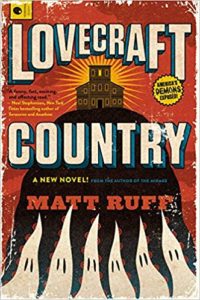In the eight linked tales that comprise Lovecraft Country, Matt Ruff takes readers on mind-stretching journeys across time and space, far more frightening trips across the mid–twentieth century US, conjures ghosts in Chicago, banishes them in New England, and summons up a sparkling cast of friends and relatives who are doing their best to live in Jim Crow America when the supernatural suddenly walks off the pages of the pulps and the comics and into their day-to-day life. The title story, first in the volume, introduces Atticus Turner, who is on his way back to Chicago after an unhappy post-Army year in Florida. A blown tire during his first hour in Indiana brings him face to face with discrimination in the North, but a fellow African-American (though the book uses “Negro,” as a sympathetic writer of the period would have done) who owns a garage in Indianapolis tows his car, and on the way back they discover a mutual interest in the science fiction of the period. Both men’s dads had also given them a hard time for liking the pulp adventures, not least because of their relentless whiteness and the often crude stereotypes on their pages.
Atticus makes it to Chicago, not without yet another encounter with a harassing white police officer, to discover that his father, Montrose, has already left, departed for a rural backwater in northern Massachusetts where, he claims, Atticus’ late mother’s family was from and where a significant legacy awaits. Atticus and his father have had a combative relationship in the past, but he does not hesitate to go and find Montrose. Joining him is his uncle George, who owns the company that publishes The Safe Negro Travel Guide, Ruff’s fictional counterpart to The Negro Motorist Green Book. George is the one who calls Montrose’s destination “Lovecraft Country,” and he knows not only the author’s work but also some of the places where fiction might not have been so fictional. Also joining them is Letitia Dandridge, a friend of the family since Atticus’ childhood, who needs a ride to a nearby part of Massachusetts. She had been the only girl in the science fiction club at school, until her mom “put an end to that, insisting that Letitia stop wasting time on foolishness and start earning her keep like her siblings, after which Atticus rarely saw her.” (p. 29)
And with that, they are off to an adventure to rival anything in the books that the three of them enjoy. Letitia is as resourceful as either of the men, providing a crucial intervention when a tip that George got for potential inclusion in the next edition of the Guide turns out to be dangerously wrong. The legacy that Atticus travels to find provides not only the climax to the first story but the bridge to more Lovecraftian intrigue in the mid-century Midwest. And elsewhere, of course. Sometimes very elsewhere.
The stories that follow — including “Dreams in the Which House,” “Abdullah’s Book,” “Hippolyta Disturbs the Universe,” or “Jekyll in Hyde Park” — riff on those themes: supernatural doings, the everyday dangers of being black in 1950s America, the joys of the interrelated characters, their varying personalities facing the usual questions of life as well as more unusual questions of the universe and everything. There are tales of passing, of unquiet ghosts, of coming to terms with terrible choices, of what one does when one is just tired of everything, of how power behaves when it thinks it can get away with anything. The characters are funny and lively, grounded even as they show their flaws and occasional pettiness.
With the characters facing mundane dangers and degradations along with the supernatural plots, it would be all too easy for a certain grimness to set in. Thinking back over the stories, though, I remember more of the characters working out what to do next while also teasing each other about one thing or another. They may not approve of each other’s actions — some of the churchier folks definitely do not think much of the apparent magic that others seem to command — but they never give up on one another. The paralysis that afflicted so many of Lovecraft’s characters is almost nowhere to be found in Ruff’s book. Visiting Lovecraft Country is great, but don’t trust the maps, things have changed.
+++
Doreen’s review of Lovecraft Country is here.


1 pings
[…] “Matt Ruff, if you XXXXX, I am throwing this book right out of the train window, and possibly Lovecraft Country too as soon as I get home and put my hands on my copy.” Not because the event would have been […]